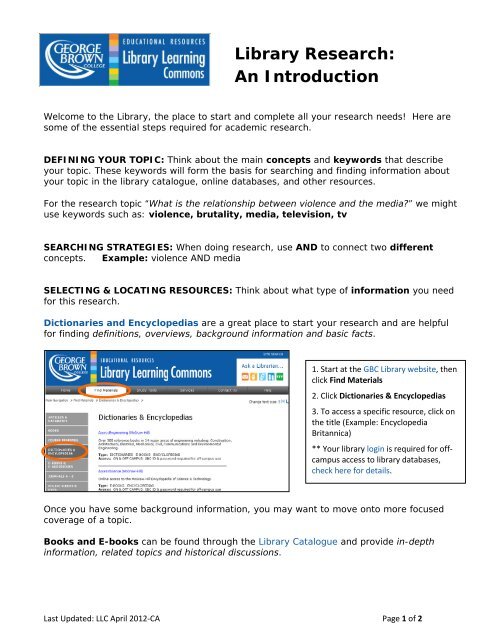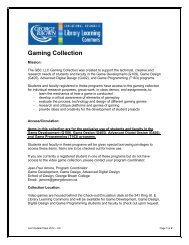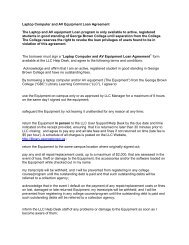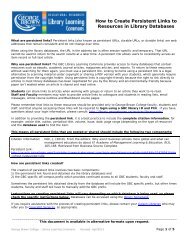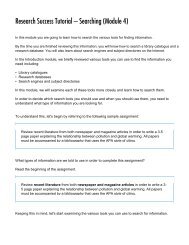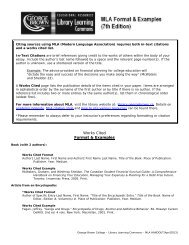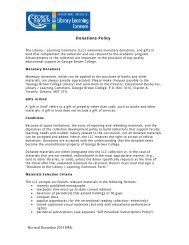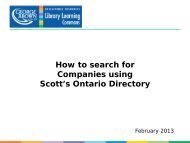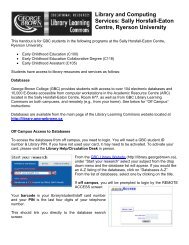Library Research: An Introduction - George Brown College Library ...
Library Research: An Introduction - George Brown College Library ...
Library Research: An Introduction - George Brown College Library ...
You also want an ePaper? Increase the reach of your titles
YUMPU automatically turns print PDFs into web optimized ePapers that Google loves.
<strong>Library</strong> <strong>Research</strong>:<br />
<strong>An</strong> <strong>Introduction</strong><br />
Welcome to the <strong>Library</strong>, the place to start and complete all your research needs! Here are<br />
some of the essential steps required for academic research.<br />
DEFINING YOUR TOPIC: Think about the main concepts and keywords that describe<br />
your topic. These keywords will form the basis for searching and finding information about<br />
your topic in the library catalogue, online databases, and other resources.<br />
For the research topic “What is the relationship between violence and the media?” we might<br />
use keywords such as: violence, brutality, media, television, tv<br />
SEARCHING STRATEGIES: When doing research, use AND to connect two different<br />
concepts. Example: violence AND media<br />
SELECTING & LOCATING RESOURCES: Think about what type of information you need<br />
for this research.<br />
Dictionaries and Encyclopedias are a great place to start your research and are helpful<br />
for finding definitions, overviews, background information and basic facts.<br />
1. Start at the GBC <strong>Library</strong> website, then<br />
click Find Materials<br />
2. Click Dictionaries & Encyclopedias<br />
3. To access a specific resource, click on<br />
the title (Example: Encyclopedia<br />
Britannica)<br />
** Your library login is required for offcampus<br />
access to library databases,<br />
check here for details.<br />
Once you have some background information, you may want to move onto more focused<br />
coverage of a topic.<br />
Books and E-books can be found through the <strong>Library</strong> Catalogue and provide in-depth<br />
information, related topics and historical discussions.<br />
Last Updated: LLC April 2012-CA Page 1 of 2
1. From the GBC <strong>Library</strong> website, click the<br />
Books tab and search for books and e-<br />
books using keywords.<br />
2. Remember it is helpful to star with a<br />
general search (Example: violence = 390<br />
books titles), then add keywords to narrow<br />
your search (Example: violence AND media<br />
= 24 titles).<br />
Check out our "How to Find a Book" tutorial or use our Search Tips for details on how to<br />
search the <strong>Library</strong> Catalogue by: Keyword, Author, and Title.<br />
Articles are helpful for finding highly specific information on a topic, new research in the<br />
field, and information on current events. To locate articles, you will need to search within<br />
a database. Select a library database that covers your general subject area. For step by step<br />
instructions, check out our tutorial “How to Find an Article”!<br />
1. Using the GBC <strong>Library</strong> website, search<br />
for Articles & Databases by Subject Area.<br />
*If you’re not sure what area to select, try<br />
General.<br />
2. Use keywords you might expect to find<br />
in the title or subject of the article.<br />
** Remember, if you receive too many<br />
results, add keywords that are more<br />
specific (using AND). If you don’t receive<br />
enough results, try being more broad<br />
(using OR). Example: media OR tv.<br />
Websites are also useful resources but remember, when searching the internet it is very<br />
important to critically evaluate the information you find. Check out some recommended<br />
websites by subject using our <strong>Research</strong> Guides and check out our guide on Evaluating<br />
Websites for helpful hints!<br />
CITING YOUR SOURCES is an essential part of college research. <strong>An</strong>y information (including<br />
ideas!) that you did not create yourself must be credited using a citation method. Check out<br />
our guides to citation styles, including APA and MLA as well as our citation tutorials.<br />
** If you have any questions please let us know, the library is here to help:<br />
via email via chat via phone in person TTY<br />
http://library.georgebrown.ca/<br />
Last Updated: LLC April 2012-CA Page 2 of 2


